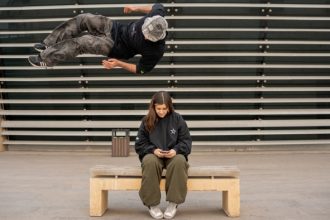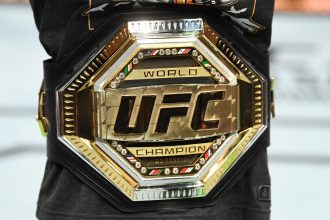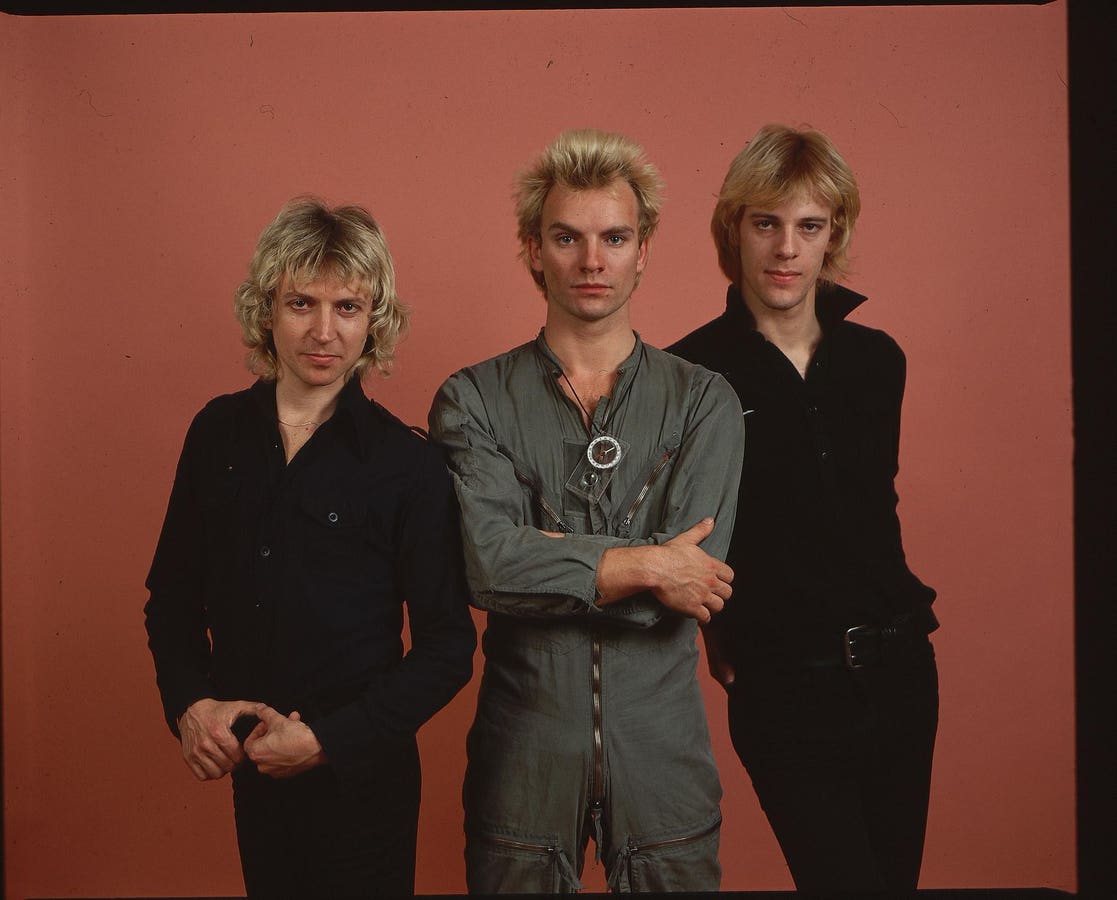For a time from the mid to late 1970s, drummer Stewart Copeland kept a consistent account of his time with his group, the Police, through his handwritten diary entries. Not only do they document the band’s early activities in very brief phrases, but they also serve as a daily record of the ordinary things in his life such as him getting sick, doing laundry, making phone calls, or being with his then-wife, singer Sonja Kristina.
“And every single Indian meal is documented,” Copeland adds recently. “Well, it was the only food worth eating at the time because English cuisine was notoriously lame. And every town had a Prince of India restaurant or the Taj Mahal. And it was always the tastiest and the most of any form of band feeding.”
Along with the Indian food, Copeland’s memories of his former band’s early years via his diary entries have been collected for his latest book, Stewart Copeland’s Police Diaries, which was published last year by Rocket 88 Books and will see a reprinting this year. It contains a blow-by-blow of the group’s history from their formation in 1976 through 1978 when they became major recording artists en route to superstardom. A good number of the diary entries are accompanied by Copeland’s recent commentary providing additional context.
The idea for the book came from a publisher who asked Copeland if he had documentation of the early period of the Police. He says: “I’ve had this idea in my mind that that moment there — the cusp between 1976, ’77, ’78, between long hair and short hair, between pot and sniffing glue, between bell bottoms and skinny ripped jeans, between love and anger—was an important watershed culturally. It’s always been interesting to me. And these diaries document, with forensic detail, exactly what that looked like.”
Before the Police formed, Copeland was the drummer for the British progressive rock group Curved Air during when punk rock was becoming the rage in the U.K. and upended the “dinosaur bands.” “I was there in London where it was all going on,” he says. “And both Sting and I were latecomers to the hippie scene. And it was, as it says in the book, kind of rancid by the time we got there. So that new scene–while it was kind of ugly and misshapen and the antithesis of all of our cultural values—at least it was fresh and new. And so we jumped on that.”
In one entry, dated Sept. 25, 1976, Copeland wrote about seeing a performance by the group Last Exit, featuring a then-unknown singer and bassist named Gordon Sumner, a.k.a. Sting. From that moment on, Copeland wanted to join forces with Sting. “He had a great-looking amp,” Copeland recalls of Sting in the early years. “He could play bass and sing. But I think the winning factor was that golden shaft of celestial light descending from the heavens upon his magnificent brow. That closed the deal.
“The guy just had charisma,” Copeland continues. “I couldn’t care less about the quality of the singing. When it came to singers, I just thought he needed to be able to carry a tune somewhat. But mainly, it was all about charisma. Stingo had it. And in his dungarees, he had it.”
In another diary entry, dated April 4, 1977, Copeland recalled himself and Sting – now as the Police with original guitarist Henry Padovani – playing a studio session for Gong bassist Mike Howlett. Also at the studio was veteran guitarist Andy Summers, who would later replace Padovani in the Police. “He had great capabilities,” Copeland says of why and Sting wanted Summers in the band. “In any chord, he could wrap his fingers around it and he could play it. But it was his very broad vocabulary on the instrument that impressed us.
“He also had a unique perspective on the guitar,” he continues. “Andy didn’t think in terms of guitar solos. He thought in terms of guitar parts, which is very literally music to the ears of a songwriter. That was very appealing to us.”
As documented in his book, and accompanied by photos and facsimiles of memorabilia, Copeland’s diaries trace the group’s ascent as they constantly played gigs that included support slots as well as recording in the studio leading up to their 1978 debut album, Outlandos d’Amour. Along the way, Copeland witnessed Sting and Summers’ growth as artists.
“When [Andy] got his pedal board and started to take it out with the different effects that he had, the echoes, the delay lines, all the huge vocabulary of things that a lot of the guitar playing is more of an atmosphere than a part even. It’s just a waft of sound, a wobble of atmosphere. That didn’t reveal itself until later on when we got to Germany.
“Both of them [Sting and Andy] had tricks up their sleeve that no one, not even us, knew were there,” Copeland continues. “We didn’t know that Sting could sing like that until we got to Germany. Then he was out of the punk environment where his voice could soar. Andy and I were going, ‘What the f***?’ Nobody knew that Sting could write those songs. He didn’t even know he could write those songs because he thought of himself as like a jazz player. He wasn’t even thinking in those terms.
“But with the distillation of punk and Henry’s limited capabilities, when Andy came in, he had that more distilled idea of how to write a song. And suddenly, he started writing those hits. When I first met him, he had no idea or inclination to be writing huge hits. So there were factors within each of us that we discovered as we went along.”
Simultaneously as the Police were rising, Copeland recorded his music as a solo artist under the pseudonym of Klark Kent. In his diary entries, Copeland talked about Kent’s brief flush with success that led to a Top 50 hit with “Don’t Care” and an appearance on the popular British music television show Top of the Pops. But luckily for Copeland, the Klark Kent phenomenon was short-lived. “Thank God, Klark Kent disappeared without a trace in the nick of time,” he says. “There’s no way that it would have achieved what the Police achieved because although whatever qualities I had on the mic, I am no Sting. On guitar, I’m no Andy. So there’s definitely a limit to how far Klark Kent could have gone. At the end of the day, I’m glad that it vaporized in the nick of time.”
Copeland’s diary entries ended after 1978 as the Police began their conquest of the pop chart; it also coincided with the drummer’s acquisition of a Super 8 camera in which he further recorded the band’s adventures –footage that was later assembled and eventually released in the 2006 film that he directed, Everyone Stares. “When I got the camera, I stopped keeping the diary,” Copeland says. “Things were moving too fast, for one thing. And I got the movie camera, which was you know my idea of just scraping off life as it goes by and stuffing it into my suitcase to play with later. The camera kind of took over that for me.”
The story behind the band’s popular success culminating in the 1983 blockbuster Synchronicity album is familiar to most fans by now. To Copeland, that story has been well-chronicled but also repetitive. “The interesting part is when we were on our hands and knees and we had nothing but each other without even the material,” he says now of those early years. “That’s the thing that struck me is that we stuck together without any songs. We knew that we were the right musicians for each other before we knew what music to play.”
In addition to his Police Diaries, 2023 was a busy year for Copeland who has released two albums, Police Beyond Borders (with Ricky Kej) and Police Deranged for Orchestra—both of which put new spins on his former band’s rich catalog—along with the reissue of the Klark Kent EP in expanded form. He continues to perform his Police Deranged shows as well as compose orchestral music for various projects.
“The reason I wasn’t able to spend this last year looking over my shoulders is because I’m pretty confident of my forward motion,” he says. “The previous summer, I had a brand new opera go up in Italy. And the summer before that, I had a brand new opera go up in Germany at the Deutsche National Theater. Very fancy. And so I’m very confident in my forward momentum so that I don’t need to be worried about looking over my shoulder. I got plenty of other stuff going on, which enables me to have fun with [the] previous works.”
Read the full article here





